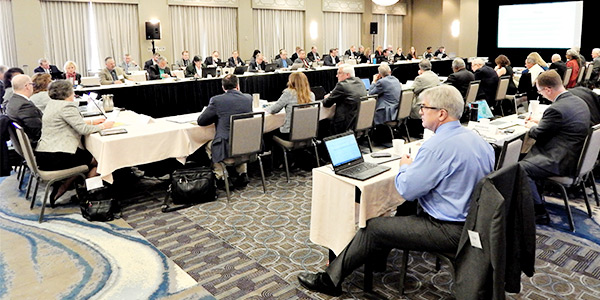By Tom Kleckner
Commission Staff Not Yet to Agreement on Cost Allocation Issues
NEW ORLEANS — Regulatory staffers have been unable to reach a consensus on possible revisions to cost-allocation rules for wind-rich areas and may table their year-long review, the Nebraska Power Review Board’s John Krajewski told the Regional State Committee Monday.
The Cost Allocation Working Group, which reports to the RSC, is considering changes to SPP’s highway/byway framework, which considers transmission facilities of 300 kV or more as highway infrastructure, with their costs allocated on a regionwide, postage-stamp basis. Facilities between 100 kV and 300 kV are categorized as byway facilities, with two-thirds of the cost assigned to the host zone and one-third allocated regionwide. Projects less than 100 kV are allocated entirely to the host zone.
Among its options, the CAWG is considering changing the 100-300-kV allocation percentage to 50% or 66% as it ponders different ways of charging for load.
The working group is also evaluating whether to consolidate transmission zones for the SPP Tariff’s Schedule 11 charges, which cover transmission construction costs. Krajewski said zones encompassing diverse areas that include wind and non-wind zones would spread byway costs over a larger footprint.
Other options include modifying the 300-kV and less allocation percentage in wind-rich zones only and using a generation-injection rate applicable to all generation or just a subset.
“As we’ve worked through this, I’ve worked on the assumption there was a problem and it needed to be fixed,” Krajewski said. “Some of my fellow CAWG members haven’t reached that point yet.
“If there isn’t a consensus [that] there’s a problem [at the group’s next meeting], we’ll put away what we’ve worked on. If we reach a point where there is a problem, I would like to see ourselves narrow those options to two or three, where we can give some detailed analysis,” he said. The CAWG’s next meeting is a conference call set for Feb. 12.
Should it come to an agreement, the CAWG plans to turn its work into a white paper and make recommendations to the RSC and the Holistic Integrated Tariff Team, which is taking a broader look at cost allocation. (See “HITT Educates MOPC on its Progress, Learnings,” SPP Markets & Operations Policy Committee Briefs: Jan. 15, 2019.)
“Those two processes need to be wedded up and worked together,” Texas Public Utility Commission Chair DeAnn Walker said of the CAWG and HITT work. “I understand there’s serious disagreement over whether there’s a problem, but there’s a lot of overlapping things here with the HITT that need to be worked on together.”
SPP, MISO Regulators in Educational Phase
Kansas Corporation Commissioner Shari Feist Albrecht told the RSC that MISO and SPP regulators working on the RTOs’ seam issues are still in the midst of their educational phase.
“We’re suffering from some beginning-to-operate-jointly pains,” said Albrecht, who represents SPP regulators on the SPP-RSC/OMS Liaison Committee.
The committee was created last year to work with SPP and MISO to improve market-based transactions and operations across the seam. (See Regulators Examine MISO, SPP Seams Issues at NARUC.)
Albrecht and Missouri Public Service Commissioner Daniel Hall moderated a panel discussion on seam issues during a recent Mid-America Regulatory Conference meeting. The committee will next meet Feb. 10 on the sidelines of the National Association of Regulatory Utility Commissioners’ winter policy summit, where it will discuss the stakeholder responses and the potential need for FERC or independent analyses.
New Mexico’s Byrd Joins RSC
The RSC welcomed Jefferson “Jeff” Byrd as its New Mexico representative. He replaces Pat Lyons, who left the regulatory arena last year.
A rancher and environmental engineer, Byrd won election in November to one of five seats on the New Mexico Public Regulation Commission. It’s the first time he has held public office, following two unsuccessful runs at the U.S. House of Representatives.







